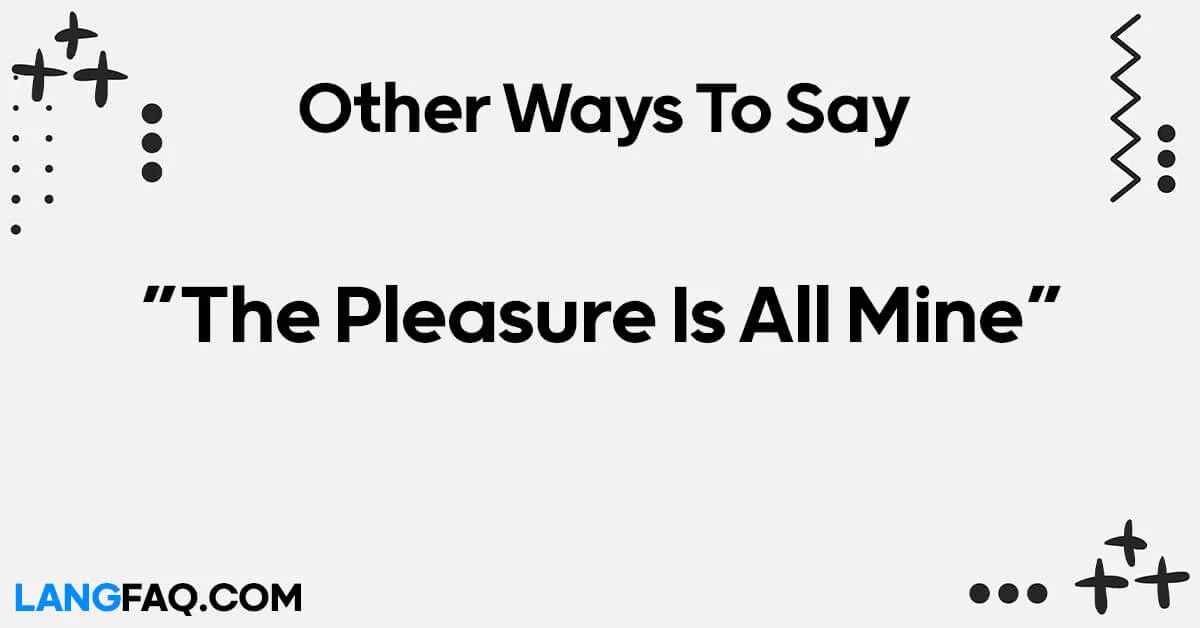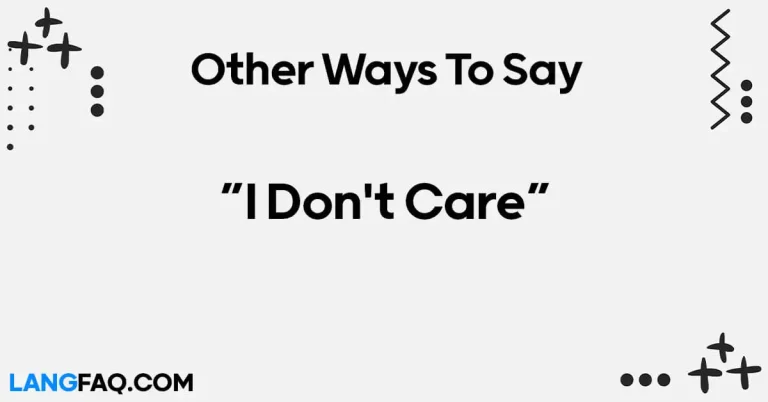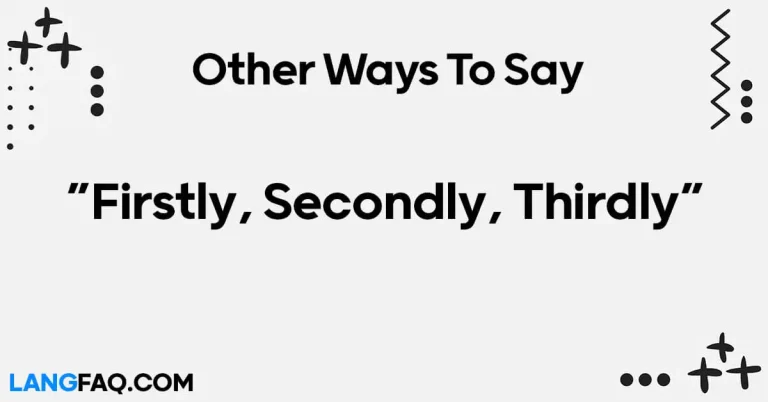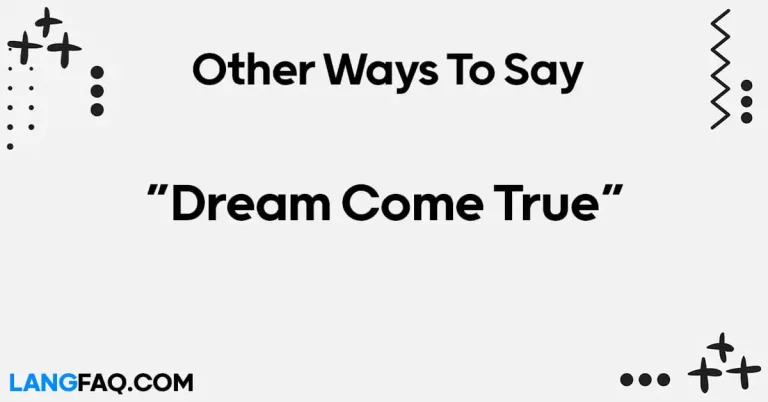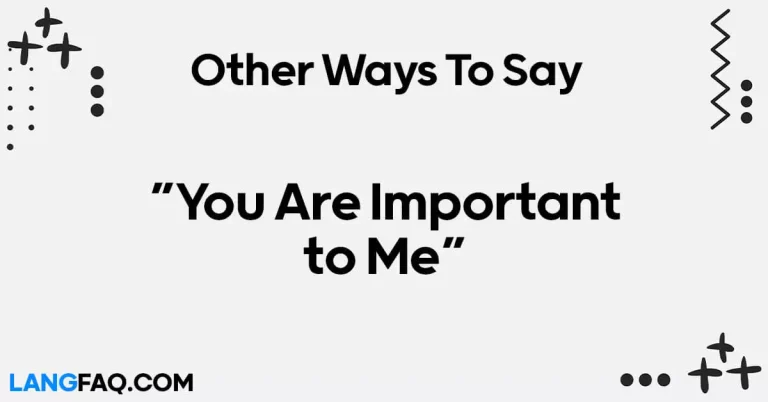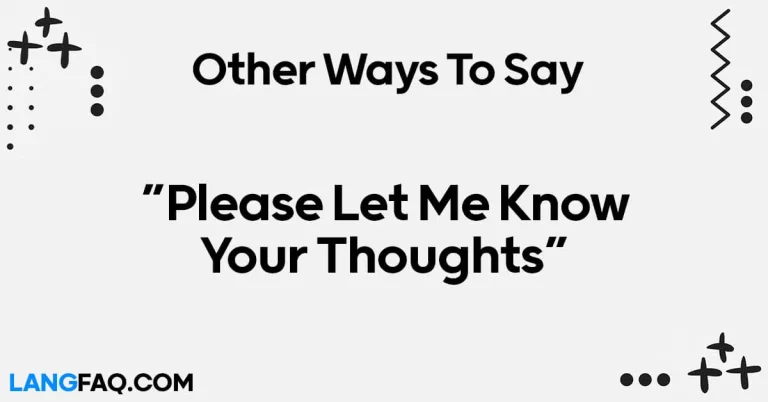Welcome to the realm of eloquence and polite exchanges. In various situations, we often find ourselves responding to gratitude with a simple “The Pleasure Is All Mine.” However, the English language offers a myriad of alternatives that not only convey the same sentiment but also add a touch of sophistication to our expressions. Join us as we explore 12 unique ways to articulate the pleasure of reciprocity.
12 Other Ways to Say “The Pleasure Is All Mine”
Here are 12 other ways to say “The Pleasure Is All Mine”:
- You’re very welcome.
- It’s my pleasure.
- Don’t mention it.
- Anytime at all.
- The honor is mine.
- I’m at your service.
- Glad to help.
- It’s a delight.
- Happy to assist.
- With pleasure.
- No problem whatsoever.
- I’m here for you.
| Expression | Meaning | Example |
|---|---|---|
| You’re very welcome. | Polite response to gratitude. | Person: “Thank you for your help.” Response: “You’re very welcome.” |
| It’s my pleasure. | Indicates personal satisfaction. | Person: “I appreciate your assistance.” Response: “It’s my pleasure to help.” |
| Don’t mention it. | Downplays the favor. | Person: “Thanks a lot!” Response: “Don’t mention it, happy to help.” |
| Anytime at all. | Expresses continual readiness. | Person: “Can I ask for your help again?” Response: “Anytime at all, feel free to ask.” |
| The honor is mine. | Acknowledges the privilege. | Person: “Thank you for your support.” Response: “The honor is mine, truly.” |
| I’m at your service. | Conveys readiness to assist. | Person: “I might need help later.” Response: “I’m at your service whenever you need.” |
| Glad to help. | Expresses happiness in assisting. | Person: “Your assistance is appreciated.” Response: “Glad to help anytime.” |
| It’s a delight. | Indicates genuine enjoyment. | Person: “I enjoyed working with you.” Response: “It’s a delight collaborating.” |
| Happy to assist. | Communicates willingness. | Person: “Can you help me?” Response: “Happy to assist, just let me know.” |
| With pleasure. | Conveys eagerness to help. | Person: “Thanks for your time.” Response: “With pleasure, always here for you.” |
| No problem whatsoever. | Downplays the difficulty. | Person: “I hope it wasn’t too much trouble.” Response: “No problem whatsoever.” |
| I’m here for you. | Indicates availability and support. | Person: “I appreciate your support.” Response: “I’m here for you whenever needed.” |
In navigating expressions beyond a simple “The Pleasure Is All Mine,” one can find a rich tapestry of ways to convey gratitude and politeness. Whether expressing delight, readiness, or a humble acknowledgment, these alternatives add depth to interactions and contribute to a positive and collaborative atmosphere.
Is It Correct to Say “The Pleasure Is All Mine”?
Absolutely, saying “The pleasure is all mine” is a polite and gracious response in English. This phrase is commonly used to reciprocate gratitude or thanks. When someone expresses appreciation or thanks you for something, responding with “The pleasure is all mine” indicates that you took pleasure or satisfaction in helping or being of service.
Here are a few scenarios where you might use this expression:
- In Professional Settings:
- Colleague: “Thank you for assisting with the project.”
- You: “The pleasure is all mine. I’m glad I could contribute.”
- In Casual Conversations:
- Friend: “Thanks for helping me move.”
- You: “Oh, the pleasure is all mine! It was a fun day.”
- Formal Occasions:
- Client: “I appreciate your dedication to our needs.”
- You: “The pleasure is all mine. It’s a pleasure working with you.”
The phrase conveys not just politeness but a sense of satisfaction and willingness to help, making it a versatile and well-received response in various situations.
Professional Mail Example With “The Pleasure Is All Mine”
Subject: Appreciation for Your Contribution
Dear [Recipient’s Name],
I trust this message finds you well. I wanted to extend my sincere gratitude for your invaluable contribution to the recent project. Your dedication and expertise played a pivotal role in its success.
Your attention to detail and commitment to excellence did not go unnoticed. The seamless collaboration we experienced has undoubtedly elevated the overall quality of our deliverables. I am genuinely appreciative of the time and effort you invested.
Thank you once again for your outstanding work. If there’s anything I can assist you with or if you have further insights to share, please do not hesitate to reach out. The pleasure is all mine, and I look forward to our continued collaboration.
Best regards,
[Your Full Name] [Your Position] [Your Company] [Contact Information]
You’re Very Welcome: A Gesture of Politeness and Warmth
Expressing gratitude is a universal virtue, and responding with “You’re very welcome” is a classic way to acknowledge thanks. This phrase goes beyond mere formality; it adds a touch of warmth to the conversation, making the person feel appreciated. It’s versatile and suitable for various contexts, from professional exchanges to casual interactions.
Scenario: Imagine a colleague expressing gratitude for your assistance on a project. Responding with “You’re very welcome” conveys not just the completion of a task but a genuine willingness to contribute to the team’s success.
Example: Colleague: “Thanks for helping out with the report on short notice.” You: “You’re very welcome! I’m always here to support the team.”
Email Sample:
Subject: Appreciation for Your Support
Dear [Colleague’s Name],
I wanted to express my sincere thanks for your quick assistance with the report. Your dedication is truly commendable, and it made a significant difference. You’re very welcome, and I look forward to more successful collaborations in the future.
Best regards, [Your Name]
Variations:
- Between Colleagues: “You’re always welcome to ask for help.”
- With Friends: “No problem at all! Friends help each other out.”
- In a Mentor-Mentee Context: “You’re very welcome. It’s my pleasure to guide you.”
It’s My Pleasure: Adding a Personal Touch to Graciousness
When aiming for a response that reflects both formality and personal satisfaction, “It’s my pleasure” is a go-to choice. This phrase emphasizes that the assistance provided wasn’t just a task but something that brought joy and contentment. It’s suitable for both professional and personal settings, adding a layer of sincerity to your response.
Scenario: Picture yourself helping a friend move to a new apartment. Responding with “It’s my pleasure” conveys that your support goes beyond a simple favor – it brings you happiness.
Example: Friend: “I appreciate your help with the move.” You: “It’s my pleasure! Anything for a friend in need.”
Email Sample:
Subject: Grateful for Your Assistance
Dear [Friend’s Name],
Your appreciation means a lot. Helping you move was more than a favor; it was my pleasure. Let me know if there’s anything else I can assist you with.
Warm regards, [Your Name]
Variations:
- In a Professional Setting: “Assisting with the project was indeed my pleasure.”
- With Family: “Cooking dinner for everyone? It’s always my pleasure.”
- Mentor to Mentee: “Guiding you through this process is my pleasure and responsibility.”
Don’t Mention It: Humble Downplaying of Favors
When aiming to downplay a favor and convey a sense of humility, “Don’t mention it” is a fitting choice. This phrase suggests that the assistance provided was a natural and effortless extension of your character, minimizing any sense of burden on the other person.
Scenario: Consider a friend thanking you for helping them with a challenging task. Responding with “Don’t mention it” maintains a casual and modest tone.
Example: Friend: “I couldn’t have done it without your help.” You: “Don’t mention it! We make a great team.”
Email Sample:
Subject: Teamwork Made it Possible
Dear [Friend’s Name],
Your gratitude is appreciated, but really, don’t mention it. We make a fantastic team, and I’m always here to support you.
Cheers, [Your Name]
Variations:
- In a Professional Context: “Don’t mention it, it’s part of the collaborative process.”
- Between Siblings: “Helping you out? Don’t mention it, it’s what siblings do.”
- Mentor to Mentee: “Your success is ours. Don’t mention it; guiding you is my pleasure.”
Anytime at All: An Open-Ended Commitment to Assistance
Providing assurance and maintaining an open channel of support is perfectly encapsulated in the phrase “Anytime at all.” This expression goes beyond a one-time offer; it establishes an ongoing commitment to be available whenever needed, creating a sense of reliability.
Scenario: Imagine a colleague expressing gratitude for your guidance on a challenging task. Responding with “Anytime at all” assures them that your support is not limited to specific situations.
Example: Colleague: “Thanks for helping me understand the project better.” You: “Anytime at all. Feel free to reach out whenever you have questions.”
Email Sample:
Subject: Always Here to Assist
Dear [Colleague’s Name],
Your gratitude is appreciated. Just a reminder, I’m here for you anytime at all. Don’t hesitate to ask if you need further clarification.
Best regards, [Your Name]
Variations:
- Between Friends: “Anytime at all, buddy. We’re in this together.”
- In a Professional Setting: “Anytime at all, feel free to consult me on similar projects.”
- Mentor to Mentee: “Remember, anytime at all, I’m here to guide you through your career journey.”
The Honor is Mine: Elevating Gratitude to a Higher Note
For occasions where you wish to express not just gratitude but also honor, “The honor is mine” is a powerful choice. This phrase is particularly fitting in formal or significant situations, adding a touch of respect and esteem to your response.
Scenario: Imagine a situation where someone expresses gratitude for your contribution to a prestigious project. Responding with “The honor is mine” conveys not just humility but also a deep appreciation for the significance of the task.
Example: Colleague: “Your insights greatly contributed to the success of the project.” You: “The honor is mine. Working on such a meaningful project was truly fulfilling.”
Email Sample:
Subject: Honored to Contribute
Dear [Colleague’s Name],
Thank you for your kind words. The honor is truly mine. Contributing to this project was an enriching experience.
Warm regards, [Your Name]
Variations:
- In a Formal Setting: “The honor is mine to collaborate with professionals of your caliber.”
- Between Mentor and Mentee: “Guiding you through this process is an honor for me.”
- Casual Acknowledgment: “Being part of this team? The honor is mine.”
I’m at Your Service: A Pledge of Dedication and Availability
When aiming to convey not just willingness but a dedicated availability for assistance, “I’m at your service” is a phrase that signifies commitment. This expression is especially fitting in professional contexts, where dedication to the task at hand is crucial.
Scenario: Consider a colleague expressing appreciation for your commitment to a challenging project. Responding with “I’m at your service” reassures them of your ongoing dedication.
Example: Colleague: “Your dedication to this project is commendable.” You: “I’m at your service. Let’s continue to make strides together.”
Email Sample:
Subject: Committed to Success
Dear [Colleague’s Name],
Your acknowledgment means a lot. I want to emphasize that I’m at your service for any future endeavors. Let’s achieve success together.
Best regards, [Your Name]
Variations:
- In a Professional Setting: “I’m at your service to ensure the success of our upcoming projects.”
- Between Friends: “No worries at all. I’m at your service whenever you need help.”
- Mentor to Mentee: “Guiding you through challenges? I’m at your service, always.”
Glad to Help: Infusing Positivity into Assistance
Expressing happiness in aiding others is beautifully encapsulated in the phrase “Glad to help.” This expression not only conveys the act of assistance but also communicates genuine joy in being of service. It’s a versatile phrase suitable for various situations, bringing positivity to your interactions.
Scenario: Imagine a friend expressing gratitude for your support during a challenging time. Responding with “Glad to help” communicates not just the action but the positive impact it had.
Example: Friend: “Your support meant a lot to me.” You: “Glad to help! Supporting each other is what friends do.”
Email Sample:
Subject: Always Ready to Support
Dear [Friend’s Name],
Your message touched me. I’m always glad to help, and remember, I’m here for you whenever you need support.
Warm regards, [Your Name]
Variations:
- In a Professional Context: “Glad to help with the project. Let me know if there’s anything else.”
- Between Family Members: “Glad to help out, that’s what family is for.”
- Mentor to Mentee: “Glad to help you navigate through your career challenges.”
It’s a Delight: Adding Charm to Gracious Expressions
Elevate your response beyond a mere acknowledgment by using the phrase “It’s a delight.” This expression goes beyond satisfaction; it conveys that the interaction brought genuine delight, adding a layer of charm and positivity to your communication.
Scenario: Picture a situation where a colleague expresses gratitude for your collaborative efforts. Responding with “It’s a delight” communicates not just professionalism but also genuine enjoyment.
Example: Colleague: “Our collaboration was highly productive.” You: “It’s a delight! Working together made the project even more enjoyable.”
Email Sample:
Subject: A Delightful Collaboration
Dear [Colleague’s Name],
I share your sentiments. It’s a delight collaborating with you. Looking forward to future projects.
Best regards, [Your Name]
Variations:
- In a Formal Setting: “Working with your team is always a delight.”
- Between Friends: “Our adventures together? It’s a delight every time.”
- Mentor to Mentee: “Guiding you through challenges is a delight and a privilege.”
Happy to Assist: Conveying Willingness with Positivity
In situations where you want to emphasize not only your readiness but also your positive attitude towards helping, “Happy to assist” is an ideal choice. This phrase exudes positivity and conveys genuine joy in being of service, making it suitable for both casual and professional settings.
Scenario: Imagine a team member expressing appreciation for your support on a project. Responding with “Happy to assist” not only acknowledges their gratitude but also communicates your enthusiasm for collaborative efforts.
Example: Team Member: “Your input greatly contributed to our success.” You: “Happy to assist! Let’s continue achieving great results together.”
Email Sample:
Subject: Committed to Success
Dear [Team Member’s Name],
I appreciate your acknowledgment. I’m always happy to assist, and I’m excited about our continued success.
Best regards, [Your Name]
Variations:
- In a Professional Context: “Happy to assist with any future projects. Let’s achieve success together.”
- Between Friends: “Happy to assist, buddy. Friends always have each other’s backs.”
- Mentor to Mentee: “Happy to assist you in navigating your career path.”
With Pleasure: Infusing Sophistication into Responses
Enhance your linguistic flair and convey genuine willingness by using the phrase “With pleasure.” This expression adds a touch of sophistication to your response, making it suitable for formal and professional contexts.
Scenario: Picture a client expressing gratitude for your dedication to their project. Responding with “With pleasure” not only maintains professionalism but also communicates your genuine enjoyment in serving their needs.
Example: Client: “Thank you for your dedicated service.” You: “With pleasure! Serving your needs is always a rewarding experience.”
Email Sample:
Subject: Satisfying Your Needs with Pleasure
Dear [Client’s Name],
I’m delighted by your satisfaction. Serving your needs is a responsibility I undertake with pleasure. Looking forward to exceeding your expectations in the future.
Warm regards, [Your Name]
Variations:
- In a Professional Setting: “Completing tasks for our clients is done with pleasure and dedication.”
- Between Colleagues: “With pleasure! Let’s make this project a success together.”
- Mentor to Mentee: “Guiding you through challenges is done with pleasure and commitment.”
No Problem Whatsoever: Downplaying Difficulties with Ease
When aiming to downplay the challenges associated with a favor, “No problem whatsoever” is a phrase that communicates not just a lack of difficulty but also an assurance that your assistance was effortless. This expression maintains a positive tone while assuring the other person that their request was easily manageable.
Scenario: Consider a friend expressing gratitude for your help with a demanding task. Responding with “No problem whatsoever” maintains a positive and easygoing tone.
Example: Friend: “I appreciate your help; it was a demanding task.” You: “No problem whatsoever! Happy to help with anything you need.”
Email Sample:
Subject: Effortless Assistance
Dear [Friend’s Name],
Your gratitude is appreciated. Helping out was no problem whatsoever. Count on me for any future assistance.
Cheers, [Your Name]
Variations:
- In a Professional Context: “Completing the project? No problem whatsoever. It’s what the team is here for.”
- Between Siblings: “Your request? No problem whatsoever. We’ve got each other’s backs.”
- Mentor to Mentee: “Answering your questions? No problem whatsoever. I’m here to guide you.”
I’m Here for You: A Pledge of Continuous Support
Conveying not just willingness but an ongoing commitment to support is encapsulated in the phrase “I’m here for you.” This expression goes beyond a one-time offer; it establishes a sense of reliability and a dedicated presence whenever needed.
Scenario: Imagine a family member expressing gratitude for your continuous support. Responding with “I’m here for you” reassures them of your unwavering commitment.
Example: Family Member: “Your support means a lot to me.” You: “I’m here for you. Through thick and thin, always.”
Email Sample:
Subject: Standing By Your Side
Dear [Family Member’s Name],
I’m touched by your words. Just a reminder, I’m here for you. Count on my support in all endeavors.
Warm regards, [Your Name]
Variations:
- In a Professional Setting: “Completing the project? I’m here for you every step of the way.”
- Between Close Friends: “Your challenges? I’m here for you, always ready to lend a hand.”
- Mentor to Mentee: “Navigating your career path? I’m here for you, providing guidance and support.”
FAQs
What is the significance of using alternative expressions for “The Pleasure Is All Mine”? Discovering alternative expressions enhances your language proficiency, allowing you to communicate with versatility and sophistication. It adds depth to your responses and showcases your linguistic finesse.
Are these alternatives suitable for both formal and informal settings? Absolutely. The listed alternatives cater to a range of contexts, from casual conversations to formal occasions. Choose the one that best fits the tone of your interaction.
How can these alternatives improve communication skills? Using diverse expressions enriches your communication skills by offering nuanced ways to convey gratitude. It also demonstrates a command of language, making your responses more engaging.
Is it necessary to memorize all the alternatives? No, the goal is to understand the variety available. Pick a few alternatives that resonate with you, and practice incorporating them into your responses for a natural and polished communication style.
Can these alternatives be used in written communication? Certainly. These alternatives are versatile and can be seamlessly integrated into written communication, enhancing the overall tone of your messages.
Is it appropriate to use these expressions in professional settings? Yes, many of these alternatives are suitable for professional settings, contributing to a positive and collaborative atmosphere.
Conclusion
Mastering the art of gracious responses goes beyond mere etiquette; it reflects your commitment to effective communication. Embrace the diverse alternatives to “The Pleasure Is All Mine,” and elevate your interactions to new heights of eloquence and charm.

